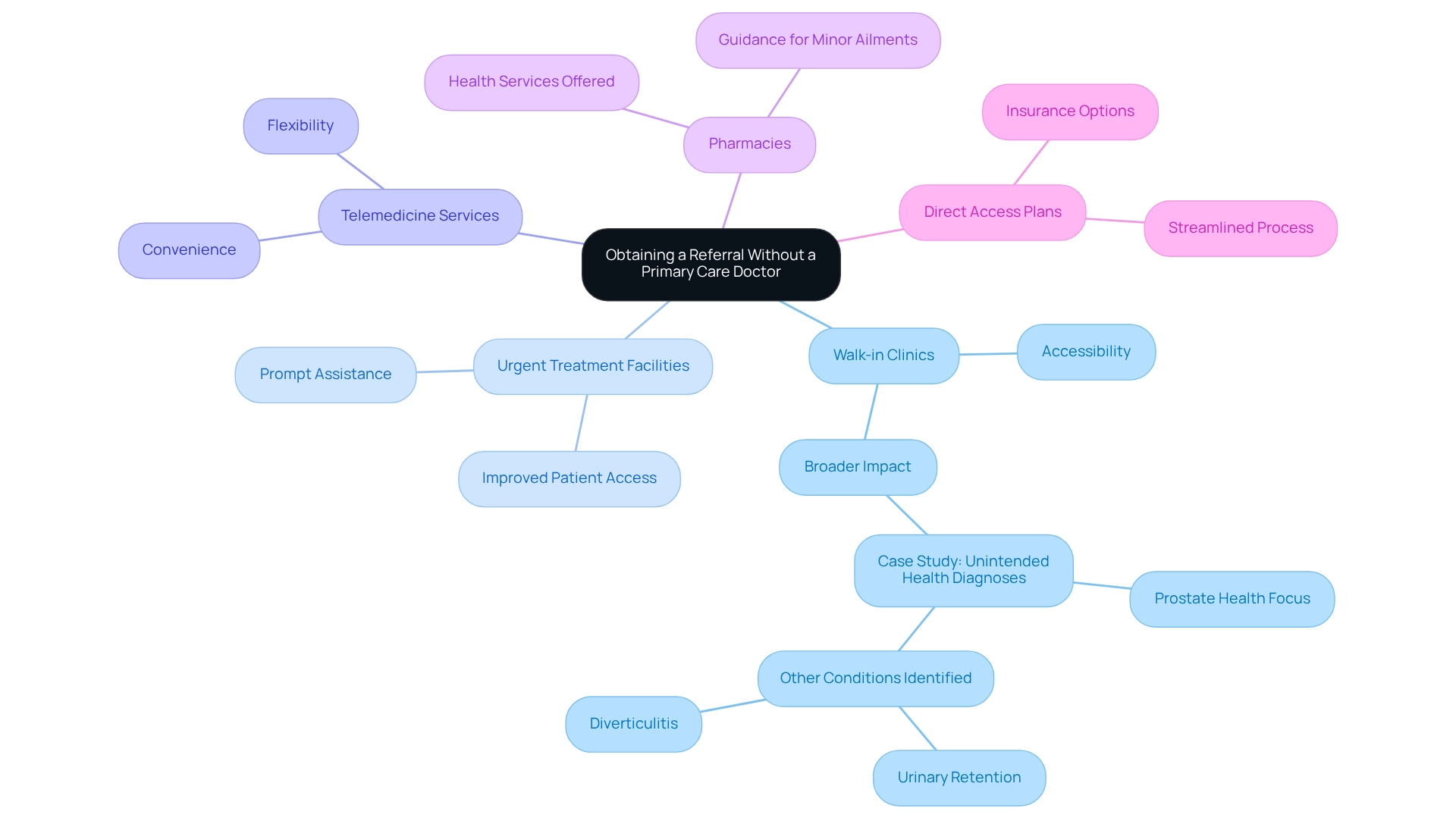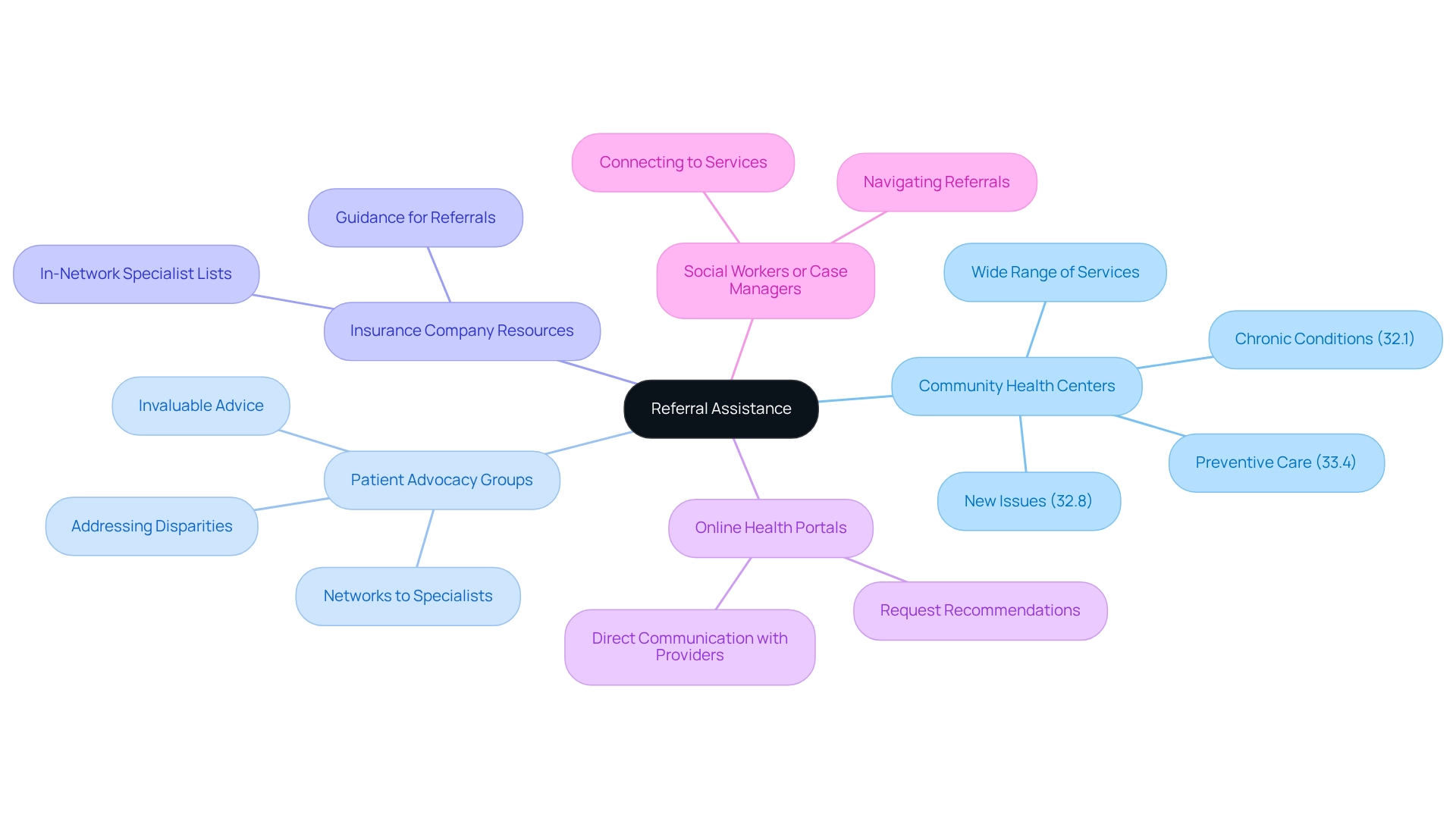Overview
If you’re feeling uncertain about how to obtain a referral without a primary doctor, know that there are alternative pathways available to you. Consider utilizing:
- Walk-in clinics
- Urgent treatment facilities
- Telemedicine services
- Community health centers
These resources are here to provide essential support, connecting you with specialists and offering guidance that is crucial for effectively navigating the healthcare system. This is especially important when insurance plans often require referrals for specialist appointments.
By reaching out to these services, you can find the help you need. Remember, you’re not alone in this journey; we’re here for you. These options can ease your concerns and empower you to take the next steps towards your health. Your comfort is our priority, and we want to ensure you feel supported every step of the way.
Introduction
In the intricate landscape of healthcare, referrals serve as a vital link between patients and the specialized care they need. They are essential for ensuring timely access to appropriate treatments, particularly for complex medical issues. Yet, navigating the referral process can be challenging, with hurdles such as insurance requirements and the risk of delayed care.
This article explores the importance of referrals, offers alternative pathways to obtain them, and highlights valuable resources to assist you in securing the care you deserve. By understanding these dynamics, you can better advocate for your health and access the specialized services that can significantly enhance your well-being.
Understand the Importance of Referrals in Healthcare
Referrals play a vital role in the healthcare system, and understanding how to get a referral without a primary doctor can act as a bridge between individuals and specialists. They ensure that you receive the right treatment at the right time, especially when facing complex medical issues.
If you don’t understand how to get a referral without a primary doctor, you might encounter challenges such as:
- Higher out-of-pocket costs
- Delays in receiving care
- Being turned away by specialists who require a recommendation
Understanding how to get a referral without a primary doctor is crucial, as it empowers you to advocate for your health needs effectively, especially since many insurance plans require referrals for specialist appointments, making it essential to navigate this process carefully. This can help you avoid unnecessary expenses and ensure timely access to the care you deserve.
Remember, we’re here for you, and your comfort is our priority as you manage your healthcare journey.
Identify Alternative Pathways to Obtain a Referral
If you do not have a primary care doctor, you can explore various methods on how to get a referral without a primary doctor. We understand that navigating healthcare can be overwhelming, but we’re here to support you.
- Walk-in Clinics: Many walk-in clinics are equipped to assess your condition and provide referrals to specialists. Their accessibility and ability to manage various medical issues make them a valuable resource. A case study titled ‘Unintended Health Diagnoses from the Clinic’ highlights how these clinics not only address specific medical concerns but also identify other issues, demonstrating their broader impact on individual well-being.
- Urgent Treatment Facilities: These establishments offer recommendations for non-emergency conditions, providing prompt assistance and direction to the suitable specialist. Statistics show that urgent treatment centers have effectively supported connections for various health issues, improving patient access to specialized services. This is particularly important for individuals who may be seeking information on how to get a referral without a primary doctor.
- Telemedicine Services: Online healthcare platforms allow you to consult with healthcare providers who can assess your needs and provide recommendations as needed. This option has gained popularity, especially for those seeking convenience and flexibility in their healthcare.
- Pharmacies: Some pharmacies now offer health services where pharmacists can provide guidance and recommendations based on your health concerns. This can be particularly useful for minor ailments or medication-related inquiries.
- Direct Access Plans: Certain insurance plans, such as PPOs, allow you to see specialists without needing a referral. Reviewing your insurance policy can clarify your options and streamline the process of accessing specialized care.
As Paul Trevatt, Macmillan Network Nurse Director, noted, “These men did attend the clinic and did refer themselves suggesting that alternative health models may have a place in supporting hard to reach groups.” This highlights the importance of utilizing diverse healthcare resources to ensure access to essential recommendations. Remember, you are not alone in this journey, and there are many options available to support your health needs.

Utilize Resources and Support for Referral Assistance
Navigating how to get a referral without a primary doctor can feel overwhelming, but there are resources available to support you every step of the way.
-
Community Health Centers: These centers are here for you, offering a wide range of healthcare services, including guidance on how to get a referral without a primary doctor, no matter your insurance status. They play a vital role in connecting individuals with essential specialists. It’s worth noting that preventive care (33.4%), new issues (32.8%), and chronic conditions (32.1%) are the primary reasons people visit these centers, underscoring their importance in addressing various wellness needs. As Loredana Santo, M.D., M.P.H. emphasizes, these centers ensure that you receive the appropriate care you deserve.
-
Patient Advocacy Groups: If you’re facing specific health issues, these organizations can provide invaluable advice on how to get a referral without a primary doctor. They often have networks that connect you directly with specialists who understand your unique needs. These groups are essential in addressing disparities in patient experiences, ensuring fair access to recommendations and care.
-
Insurance Company Resources: Don’t hesitate to reach out to your insurance provider for a list of in-network specialists and guidance on how to get a referral without a primary doctor. This tailored information can help streamline your search for the care you need.
-
Online Health Portals: Many healthcare systems now offer online platforms where you can easily request recommendations or communicate directly with healthcare providers, providing guidance on how to get a referral without a primary doctor.
-
Social Workers or Case Managers: If you’re receiving assistance in a hospital or community setting, social workers can be invaluable in navigating how to get a referral without a primary doctor and connecting you with essential services. Their expertise can ensure that you receive the support you need.
However, it’s important to remain aware that potential changes to the Medicaid program could impact funding for these centers, which may affect access to care in underserved areas. This highlights the importance of utilizing community health centers for referrals, especially considering the financial stability and future risks they face, as noted in recent case studies. Remember, you are not alone in this journey; support is available, and your comfort is our priority.

Conclusion
Navigating the referral process in healthcare is vital for accessing the specialized care necessary to manage complex health issues. Referrals serve as a crucial link, ensuring timely treatment while helping to minimize out-of-pocket costs and avoid delays in care. By understanding the significance of referrals, patients can advocate more effectively for their health needs, especially in a system where many insurance plans require them.
For those without a primary care doctor, various alternative pathways are available to secure referrals:
- Walk-in clinics
- Urgent care centers
- Telemedicine services
- Pharmacies
Additionally, certain insurance providers offer direct access plans that simplify the process by allowing patients to see specialists without a referral. Recognizing and utilizing these resources can significantly enhance access to care and improve overall health outcomes.
Furthermore, leveraging support from community health centers, patient advocacy groups, and online health portals can streamline the referral process. These resources are indispensable in connecting patients with the appropriate specialists and providing guidance throughout their healthcare journey. As the healthcare landscape continues to evolve, understanding and navigating the referral process remains essential for ensuring that patients receive the care they deserve.
Ultimately, being informed and proactive in seeking referrals can lead to more effective treatment and a better quality of life. Remember, you’re not alone in this journey; there are many resources available to support you every step of the way.
Frequently Asked Questions
Why are referrals important in the healthcare system?
Referrals are vital as they help ensure that individuals receive the right treatment at the right time, particularly for complex medical issues.
What challenges might arise if I don’t know how to get a referral without a primary doctor?
Challenges may include higher out-of-pocket costs, delays in receiving care, and being turned away by specialists who require a recommendation.
Why is it crucial to understand how to get a referral without a primary doctor?
It is crucial because it empowers individuals to advocate for their health needs effectively, especially since many insurance plans require referrals for specialist appointments.
How can understanding the referral process help me financially?
Understanding the referral process can help avoid unnecessary expenses and ensure timely access to the care you deserve.











